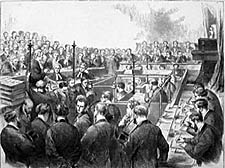
The Overend and Gurney Trial by Antoine Durand |
A Victorian morality tale for our times
The Overend and Gurney financial affair rocked Victorian society and was the ‘Barings scandal’ of its day, writes Illtyd Harrington
THE MYSTERY OF OVEREND & GURNEY: A FINANCIAL SCANDAL IN VICTORIAN LONDON by Geoffrey Elliot. Methuen, £18.99 order this book
JESUS drove the moneylenders out of the Temple in Jerusalem. But it was greed which caused Christian bankers Overend and Gurney to collapse on Friday May 10 1886.
Second only to the Bank of England at the time, they were found to have catastrophic debts of £1 billion in today’s terms after the crash. Subsequently more than 200 other companies collapsed in domino fashion.
In The Mystery of Overend and Gurney, Geoffrey Elliott, with refreshing candour and witty asides, opens up mid-Victorian London and goes to the heart of the city’s wheeler dealing, with Bills of Exchange, dodgy payouts and a gallery of brilliant characters.
The Gurneys from Norwich, then Britain’s second city, were eminent Quakers – solemn and stainless. Their sect was into everything – biscuits, Barclays bank, chocolates, coal, shoes, medicine, wool, mustard, pots and pans – but, above all, money.
Then London still had 15 per cent of UK manufacturing. In the Age of Invention and Reform, opulence stared at poverty. Leadenhall Market in the 1850s sold 1.5 million chickens, 45,000 geese, 85,000 partridges and quarter of a million larks a year.
Meanwhile, the poor got by on bread, potatoes, herring and offal while bank clerks worked six days a week from seven until eight.
The Gurney banking dynasty held pride of place – immaculate and impeccable. Then the speculation game speeded up and they were swept into major projects, civil and engineering, which inevitably collapsed.
Anthony Trollope, the 19th-century novelist wrote about these Robert Maxwells whose daring games paid off in the short term.
Amongst them were Greek novelist and entrepreneur Stephanos Xenos and Father Peter Daly who ran the city of Galway and owned transatlantic ships. The new Millwall Shipyard soaked up millions and was known as the Overend and Gurney graveyard.
Then there was ‘Baron’ Grant, alias Albert Gottheiner, the junk bond magician of his day – a morning-coated mugger.
Probably Trollope’s character Augustus Melmott in his novel The Way We Lived was based on him.
Even after the spectacular collapse, as Elliott reveals, many of the principle players left hefty fortunes. The directors were brought to trial and were acquitted.
In 1859 John Gurney had pocketed the equivalent of £10 million profit a year. It all turned to ashes at 3.30pm on the tenth of May 1866.
A hundred or so years later, Nick Leeson brought down the ultra–respectable Baring brothers with insider trading. Elliott, a former banker in the City and Wall Street, has a sharp eye and quick penetrating prose.
He has written a visual history of a growing and dynamic Metropolis as well as a perceptive portrait of men who worshipped Mammon six days a week and hid behind God on Sundays.
A piece of embroidery in a Quaker meeting-house has St Paul’s Epistle to the Romans: “Not slothful in business. Fervent in spirit. Serving the Lord”. Very proper too. But add to the cash as often and as much as you can whilst doing so should have ended this particular prayer.
|



